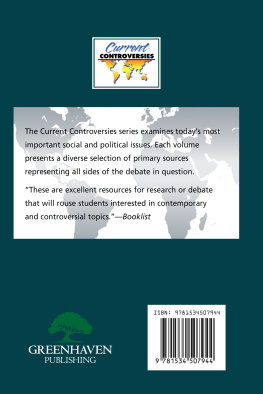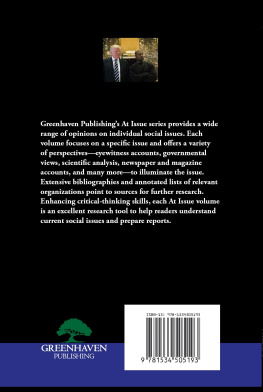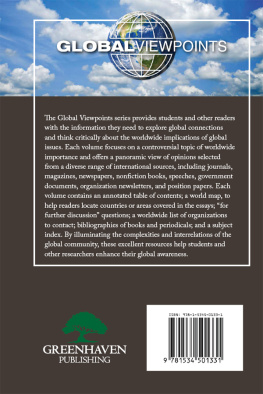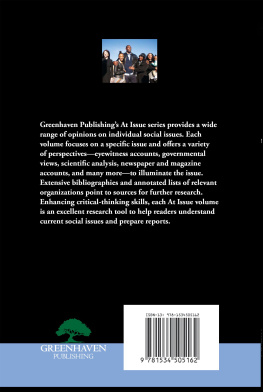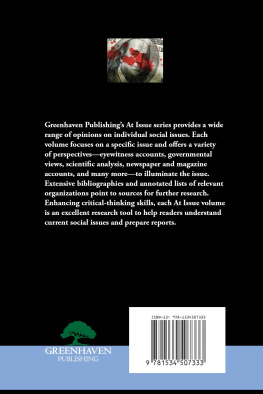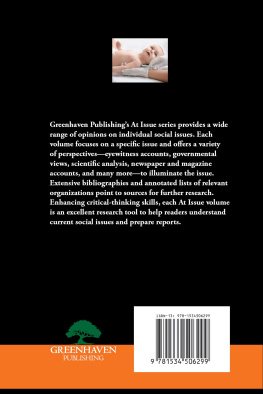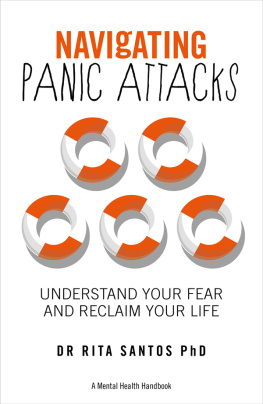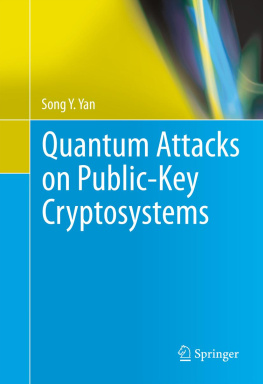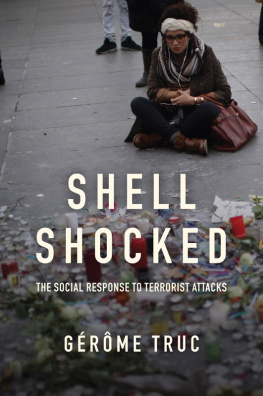
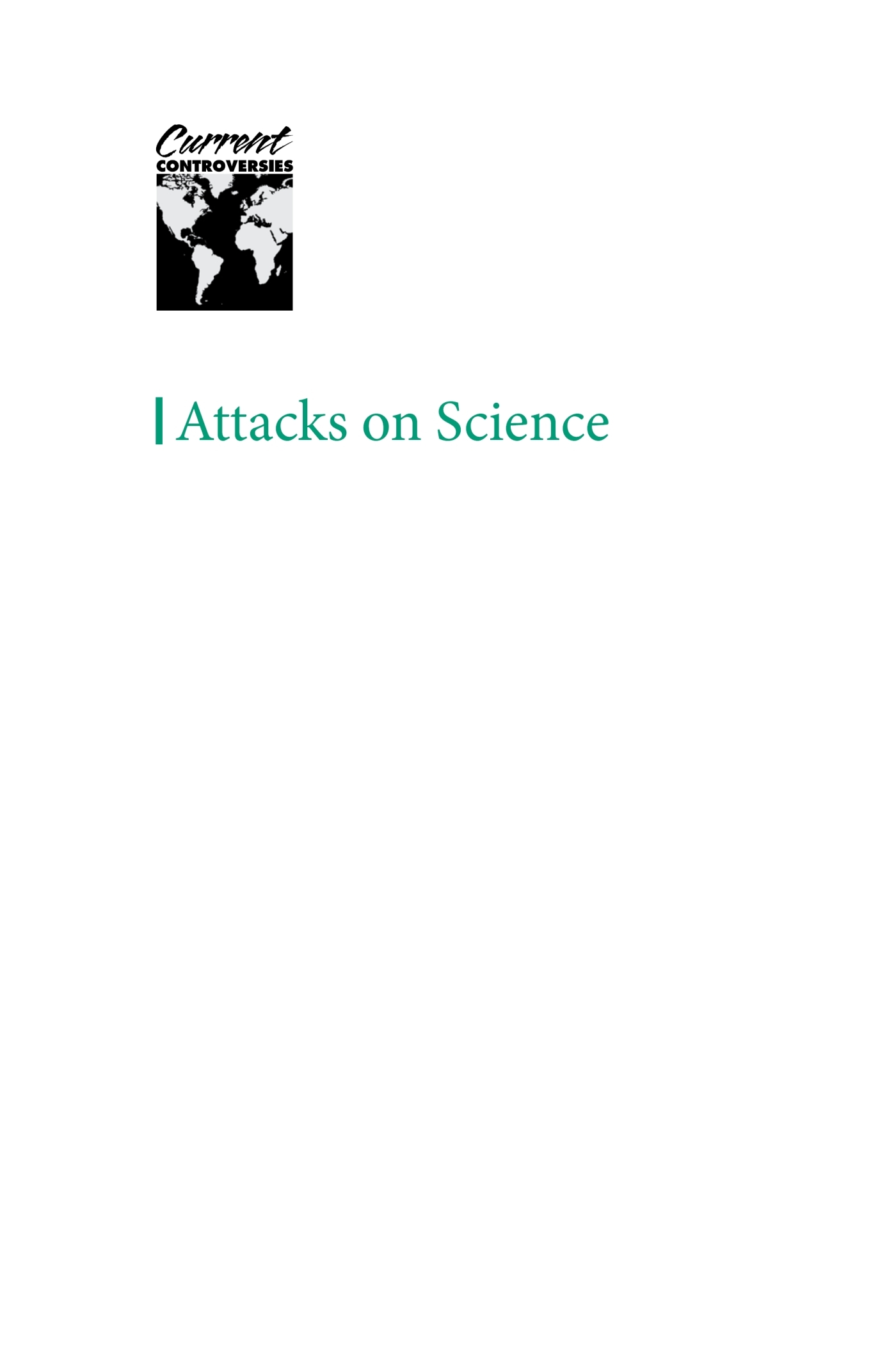
Other Books in the Current Controversies Series
Agriculture
Domestic vs. Offshore Manufacturing
Fossil Fuel Industries and the Green Economy
The Gig Economy
Hate Groups
Holocaust Deniers and Conspiracy Theorists
Immigration, Asylum, and Sanctuary Cities
The Internet of Things
Libertarians, Socialists, and Other Third Parties
Nativism, Nationalism, and Patriotism
Sustainable Consumption
Published in 2022 by Greenhaven Publishing, LLC
29 East 21st Street, New York, NY 10010
Copyright 2022 by Greenhaven Publishing, LLC
First Edition
All rights reserved. No part of this book may be reproduced in any form without permission in writing from the publisher, except by a reviewer.
Articles in Greenhaven Publishing anthologies are often edited for length to meet page requirements. In addition, original titles of these works are changed to clearly present the main thesis and to explicitly indicate the authors opinion. Every effort is made to ensure that Greenhaven Publishing accurately reflects the original intent of the authors. Every effort has been made to trace the owners of the copyrighted material.
Cover image: shuttermuse/Shutterstock.com.
Library of Congress Cataloging-in-Publication Data
Names: Idzikowski, Lisa, editor.
Title: Attacks on science / Lisa Idzikowski, book editor.
Description: First edition. | New York: Greenhaven Publishing, 2022. | Series: Current controversies | Includes bibliographical references and
index. | Audience: Ages: 15 | Audience: Grades: 1012 | Summary: The viewpoints in this title consider the impacts of attacks on science, whether these attacks can be stopped, and how they can be prevented. It also examines the role of the internet in propagating and legitimizing these attacks Provided by publisher.
Identifiers: LCCN 2020051526 | ISBN 9781534507944 (library binding) | ISBN 9781534507920 (paperback) | ISBN 9781534507951 (ebook)
Subjects: LCSH: ScienceSocial aspectsJuvenile literature. | SciencePolitical aspectsJuvenile literature. | SciencePublic opinionJuvenile literature.
Classification: LCC Q175.5 .A88 2022 | DDC 306.4/5dc23 LC record available at https://lccn.loc.gov/2020051526
Manufactured in the United States of America
Website: http://greenhavenpublishing.com
Nick Frost
What constitutes good or bad science? Why is some science accepted as legitimate, while some is widely seen as bad? And what is junk science?
Yes: Attacks on Science Can Be Scientifically Legitimate
Seth Shostak
There was a time when science was easier to understand and believe by non-scientists. Today, science can be too sophisticated and complex for the average person to understand. Scientists strive to uncover the truth and will correct fellow scientists if they make errors in judgment or experimental practice.
Elisabeth Pain
Scrutiny of scientists and scientific work by other scientists is necessary and should be expected. This scrutiny may seem to be personal at times, but it should not be viewed as such. Scientists need to accept close examination by others.
No: Attacks on Science Are Not Legitimate
Georg Scholl
Scientific research might begin with a hunch or belief by scientific practitioners, but it leads to proven knowledge, proof being the key idea. Whereas religion can be rooted in beliefs and mysticism, it does not need toand cannot beproven.
Andrew Rosenberg
The Trump administration attacked science on all fronts. By eliminating programs and placing non-scientists into positions of power, the most important scientific agencies were dissolved or gutted at the expense of the American people.
Climate Investigations Center
Using cherry-picked evidence, incorrect science, and economic scare tactics, energy corporations are both carrying out systematic attempts themselves and hiring other groups to prove climate science wrong and undermine critical warnings.
Valent Rull
Science, scientific research, scientific knowledge, and its practiced results are inherently necessary for humanity. Science must be allowed to flourish, and scientific education starting at a young age must be enhanced so people everywhere will benefit.
Yes: Attacks on Science Are Harmful to Society
Oxford University
Humans are biologically complex, and in order to make useful medical discoveries, animals with the same general body complexity must be used for research purposes. Methods have advanced, and test subject animals are treated humanely.
Teal Burrell
Animal models have been used in medical research for hundreds of years. Now, biologically inspired engineering is developing alternate models to reduce the number of animals used.
No: Attacks on Science Are Not Harmful
Kai Kupferschmidt
Certain areas of science must be contained. This includes artificial intelligence (AI). Some experts agree that AI could be the cause of humanitys downfall or extinction and, consequently, should be watched over for unintended consequences or accidental calamity.
Anthony Wrigley
It is ethical and prudent to challenge the practice of experimentally using human beings in medical research. The many ways people have been used in historical and present-day medical research is analyzed and questioned. Is this necessary given the risks and challenges?
Cond Nast
Scientists work under a set of ethical guidelines when developing and carrying out research. There have been some experiments posed theoretically that could provide answers to long sought out questions but would never be conducted because of questionable ethic concerns.
Dr. Dave Hone
What does a true scientific debate look like? It definitely is not a couple of outsiders or outliers who put up a defense against a long accepted scientific point. The media plays a part in whipping up a so-called debate when there really isnt anything there and should not be given space for these misguided campaigns.
Yes: Attacks on Science Need to Be Prevented
Laura H. Kahn
Science has helped society in many ways since historical times. A vital service in modern times is prevention of outbreaks and pandemics. The only way to achieve this is to understand evolution and to implement its scientific precepts. Attacks on teaching evolution must be prevented and stopped.
Joe Lawlor
Vaccinations prevent disease and are a valuable tool for public health. People refuse vaccinations for different reasons. It is argued that the ability of parents to opt out of vaccinations for their school-aged children because of religious beliefs should be prevented. Some people say they have religious objections against vaccination, but many, if not most mainstream religions favor children receiving vaccinations.
Bobby Allyn
Some states, including New York, are helping themselves to stop communicable disease by fighting off the junk science peddled by anti-vaxxers. Laws have been passed to prevent attacks by anti-vaxxers and to close loopholes that allow refusal to vaccinate based on religious conviction. Other states have followed New Yorks example to accept science instead of attacking accepted medical practice.
No: Certain Regulations of Science Is Appropriate
C. Michael White
Next page
